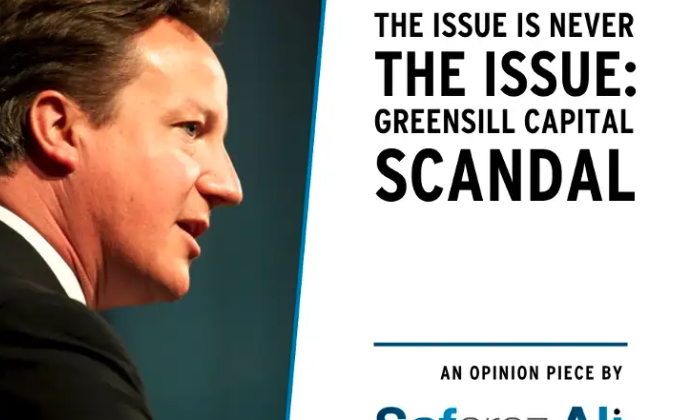
The issue is never the issue
The Issue is never the issue
The Greensill Capital Scandal story has been all over the media for a while with many unanswered questions and a patchwork of serious flaws within due process, governance, and potentially outright fraud, coming from a finance background with a general interest in politics as well, I have been intrigued and interested in this story possibly more than most. However, the story is not the story I first thought it was.
We the public in general are seeing it as a story of the bankers doing evil once more, coupled with big business greed and the whole thing facilitated often by naïve civil servants and negligent or at worst outright dishonest politicians. The end to the saga is a tragedy with potentially 35,000 staff worldwide affected and over £5bn of finance exposure that has to be accounted for.
There are many questions to be answered, mainly about who did what, who knew what and further on this so called ‘symbiotic’ nature of the relationship between the two leading figureheads: the banker Lex Greensill and the Steel Tycoon Sanjeev Gupta.

It is not just banking and finance that is at play here. Nor is it just unscrupulous global business. Politics and government are a huge part of the story and this is where we have Jeremy Heywood who sadly passed away a few years ago. He was one of UK’s most powerful civil servants, in fact he was the head of the entire civil service. Somehow, David Cameron got convinced when he was prime minister that Lex Greensill was very astute forward thinking and therefore will be an asset as an adviser to the PM. Lex did become an adviser to David Cameron and therefore had access to almost all areas within government and the civil service with a desk inside Number 10 Downing Street.
Fast forward a few years and David Cameron upon losing office is offered a job by Lex Greensill, You then have several years where he is jet setting around the world alongside Lex Greensill meeting Sheikhs and word leaders and what have you!
Covid interrupts everything business and life when it comes to 2020 and Greensill desperately needed and or wanted access the Covid loan schemes. The UK government was setting up four or five different debt schemes to help companies that were genuinely struggling because of the pandemic. Greensill were having some difficulty getting approval of the loans, so David Cameron rang and texted the Chancellor Rishi Sunak as you do! This is in addition to having around 10 meetings with the two most senior civil servants in the Treasury.
This whole debacle will no doubt tarnish further the reputation of David Cameron who is still remembered for the Brexit misjudgement. But with this story doing the rounds now to no possible upturn, there is not much of an opportunity of changing the script with a new legacy for David.
The story has another figure — The tycoon Sanjeev Gupta who is instrumental to it all crashing, his ego and behaviour leading to the almighty drop. Sanjeev was on a relentless pursuit of buying up steel and aluminium assets around the world from very large steel companies. He bought these up in very rapid succession and built quite a big company, GFG Alliance. People saw him as a sort of messiah, securing jobs and on the face of it making a very unloved yet vital sector work.
The foundation of GFG Alliance was built on highly aggressive financial engineering. Greensill was the lender which enabled a lot of this rapid growth through acquisition, because they were providing the finance for it.
Sanjeev Gupta used the supply chain finance from Greensill without any caution and in a very aggressive way. Any financing should always be based on legitimate invoices. However, supposedly un-beknown to anyone, the financing that Greensill did was based on invoices that didn’t exist with the excuse given that these are invoices which were going to exist in the future.
Sanjeev Gupta loved hobnobbing with politicians, and this proved quite fruitful previously. In lots of countries, he got support from the state. However last year things really started to get tricky for business and for raising finance. Sanjeev Gupta had to let go of hundreds of workers in the UK. He started applying and getting UK government backed Covid loans.
The story unfolds with Gupta’s GFG Alliance Group making a last-ditch attempt by going cap in hand the UK government to ask for a £170m bailout, somebody in the government came to their senses eventually when the UK government refused.

That is briefly the story thus far. We can see the issues now in plain sight, the enquiries and investigations will carry on — Britain’s Serious Fraud Office are investigating, no doubt politicians will also look at the lobbying aspect again as well as the regulators doing their own review in due course.
I would like to take you back to the beginning and suggest to you that the root of this issue originated from the man himself Lex Greensill who made Greensill Capital, which was simply a plain and boring supply chain finance business with low margins into a modern equivalent of a dotcom business by calling it a tech business.
So what was the key to the original success? Greensill’s trick was marketing coupled with positioning. Lex Greensill being a charming influencer was able to persuade people that his plain and vanilla supply chain factoring business was really a technology solutions business. Lex bought a bank that was nearly 100 years old, renamed it and started creating hype around “technology” — there was no tech, it was just a fantasy.
Lex Greensill was the ultimate pedlar. His pitch talked about AI, machine learning, all these buzzwords. How it was all going to manage risk and help make safer and more profitable decisions.
The media in general recently have questioned whether it was the technology that was the new thing. Or whether it was the smooth, brash, salesman skills of Lex Greensill which enabled him to open so many doors and sell his financing to so many powerful figures and organisations.
The so-called technology coupled with his whole story was central to the company’s rise. He would talk about making a difference, making a change and ultimately it was just a façade, an act but one where the lead actor believes he is what is pushing. He believes he has invented a technology; he believes he is a disruptor and as he believes so convincingly himself, he convinces others who just take it all on face value.

The first of these is General Atlantic, an American private equity growth firm gave Greensill $250m and because of their track record and name in the market place this would lead to others following along therefore the original financiers themselves have nothing much to lose!
That is the critical thing, you call it a tech, you focus on branding and position and all efforts are then on raising finance even though there is not much of business there. You get the finance because of the back story that finance leads to other finance until someone is left holding it all and picking up the pieces!
In this world we have the real disruptors who have used technology as the core of the business — businesses like Uber who are a technology business and have truly disrupted the marketplace and then the many pretenders out there.
It’s like the rebirth of the 1990s dot com era, where any business just added the word dot com after their name and created a website. In this era, we have something very similar happening, we have businesses, some successful, others in their early days trying to differentiate themselves using technology. The education company that calls itself an EdTech, the HR business that adds HRTech to its marketing, the solicitor’s firm that now says it is a LawTech, the home care business that is saying it’s a HealthTech and in this same cycle we have PropTech, FinTech, FoodTech, GreenTech and so on and so forth.
Digging deeper into some of these businesses there is very little technology (if any). Most often than not they rely on third-party companies for some automation, and maybe some intelligence but this mainly for ease and speed of use than anything which is evolutionary in nature.
The lessons for all of us is we need to be wary of the “somethingtech” camp, not in all cases but in high numbers to worry and be wary of. We are now in a period of business where business is about raising finance rather than attracting and serving customers. The product and service become a by-product and growth is achieved via financial capital and engineering. This is the lunacy of it all, the leadership of these business are so tunnel vision focused on raising finance that they forget the fundamentals and what is the core business!

The story of Greensill, Gupta and David Cameron will no doubt be further played out in the media. This is no doubt a story of scandal, corruption, lobbying but at the heart of it is a tale of branding and marketing with a touch of the fairy tale of the Emperor’s new clothes for inspiration. How someone could virtually out of thin air create a simple basic unremarkable concept that really has very little about it and just by calling it a fintech, you engineer a differentiator and force for disruption where one does not exist. I think therefore they say that if you say something often enough not only do you start believing it, but you can then get everyone else to believe it also.










